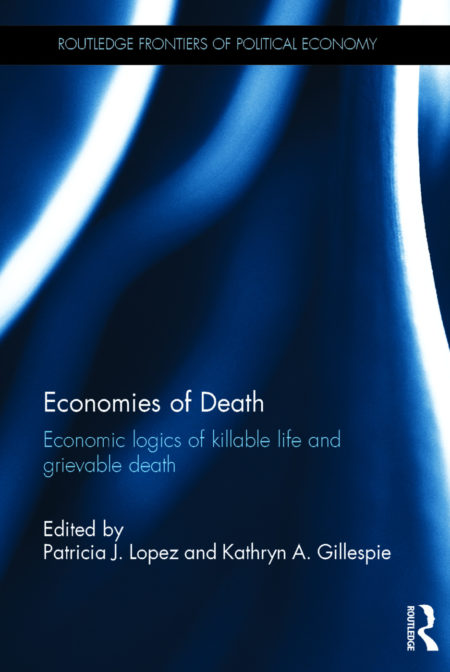Patricia J.Lopez
Assistant Professor of Geography University of washington
I am a historical health and human geographer by training, and my research and teaching start from two interconnected themes. First, I am concerned with matters of differential value: how are different lives valued differently and how these different valuations acted upon and lived through in particular places and time? Second, I ask how do we come to care (for and about others, near and far) and in what ways? Together, these two themes focus on individuals and communities, both historically and contemporarily, that have been marginalized and racialized in moments and sites of ‘benevolence’ (care). With this sharp focus, geographical questions emerge about how presumably universal ethics that frame social, political, and economic relations within and between countries and populations are (or are not) actually enacted. I enter into these conversations through geographies of health and disease, examining the discursive and material practices that mark places and people as always-already diseased. This materializes in, for instance, experiential learning practices wherein I invite students to learn together and from each other. In this, students lead reading discussions and give presentations on their work; draw on their work and volunteer opportunities as a practice of applied ethics; and, work together on outlines, study guides, and other course materials. This also means that I am attentive to students’ individual needs.

Central to my thinking as an educator is the importance of building relationships of mutuality and trust to foster an inclusive learning and living environment.
Education

BA
Bachelor of Arts in Comparative History of Ideas (CHID)

MA
Master of Arts in Geography

phd
Doctorate of Philosophy in Geography
Books

Economies of Death
Economic logics of killable life and grievable death

Vulnerable Witness
The Politics of Grief in the Field
refereed articles and book chapters
Lunstrom, Libby, Rosemary Collard, Bruce Braun, Neel Ahuja, Patricia J. Lopez, Rebecca Wong. 2021. “More-than-human and deeply human perspectives on COVID-19” Antipode https://doi.org/10.1111/anti.12730
Lopez, Patricia J. and Abigail H. Neely. 2021. “Fundamentally uncaring: The differential multi-scalar impacts of COVID-19 in the U.S” Social Science and Medicine. 272: 113707-DOI: https://doi.org/10.1016/j.socscimed.2021.113707
Lopez, Patricia J. and Kathryn Gillespie. 2019. Introduction, in Vulnerable Witness: The Politics of Grief in the Field. University of California Press, Public Anthropology Book Series
Lopez, Patricia J. and Kathryn Gillespie. 2019. Epilogue, in Vulnerable Witness: The Politics of Grief in the Field. University of California Press, Public Anthropology Book Series
Lopez, Patricia J. 2019. “Toward a care ethical approach to access to US health care in neoliberal times,” Gender, Place, and Culture. 26(6): 830-846.
Lopez, Patricia J. and Kathryn A. Gillespie. 2016. “A love story: For ‘buddy system’ research in the academy.” Gender, Place, and Culture, 23(12): 1689-1700
Lopez, Patricia J. 2015. “American Red Cross posters and the cultural politics of motherhood in World War I ” Gender, Place, and Culture. 23(6): 769-785.
Lopez, Patricia J. 2015. “Clumsy beginnings: From modernizing mission to humanitarianism in the U.S. occupation of Haiti, 1915-1934,” Environment and Planning A. 47(11): 2240-2256.
Lopez, Patricia J., Lisa Bhungalia, Leonie Newhouse. “Introduction: Geographies of Humanitarian Violence” Themed Issue (eds). Environment and Planning A. 47(11): 2232-2239.
Gillespie, Kathryn A. and Patricia J. Lopez. 2015. “Introducing economies of death.” In Patricia J. Lopez and Kathryn Gillespie (eds) Economies of Death: Economic logics of killable life and grievable death. London: Routledge, 1-13.
Gillespie, Kathryn A. and Patricia J. Lopez. 2015. “Economies of death: an ethical framework for future directions.” In Lopez, Patricia J. and Kathryn Gillespie (eds) Economies of Death: Economic logics of killable life and grievable death. London: Routledge, 179-190.
non-refereed articles
Neely, Abigail and Patricia J. Lopez. 2020. Care in the time of COVID-19. Intervention. Antipode. https://antipodeonline.org/2020/03/10/care-in-the-time-of-covid-19/
Lopez, Patricia J. 2018. Book Review: Who Owns Haiti? People, Power, and Sovereignty. Robert Maguire and Scott Freeman. Gainesville, FL: University Press of Florida. In Journal of Latin American Geography.
DeSilva, Erin, Adam Nemeroff, and Patricia J Lopez. 2017 “Igniting a Universal Design Mindset on Campus.” Educase. https://er.educause.edu/articles/2017/12/igniting-a-universal-design-mindset- on-campus
Gillespie, Kathryn A. and Patricia J. Lopez. 2015. “Introducing economies of death.” In Patricia J. Lopez and Kathryn Gillespie (eds) Economies of Death: Economic logics of killable life and grievable death. London: Routledge, 1-13.
Gillespie, Kathryn A. and Patricia J. Lopez. 2015. “Economies of death: an ethical framework for future directions.” In Lopez, Patricia J. and Kathryn Gillespie (eds) Economies of Death: Economic logics of killable life and grievable death. London: Routledge, 179-190.
Morrill, Richard, Caren Goldenberg, Tish Lopez, Scott Crain, and Lauren Peach. 2011. South King County Medicaid Access Study: Preliminary Findings. Washington Medical Legal Partnership. Seattle, WA. Available at: http://www.washingtonmlp.org/ (Poverty and Race Research Action Council and Annie E. Casey Foundation grants).
Huong, Huang Ti, Niem Tu Huynh, Wei Li, Patricia J. Lopez, and Minori Yuda. 2010. Migration case study: Why does gender matter in migration? In Solem, M., Klein, P., Muñiz-Solari, O., and Ray, W., eds., AAG Center for Global Geography Education. Available: http://globalgeography.aag.org (National Science Foundation Grant)
Herbert, Steve, Patricia J. Lopez, Matt Townley. 2010. Design of Evaluation Model for Three Human Services/Public Safety Programs. University of Washington, Seattle, WA (City of Seattle, Health and Human Services grant).
Herbert, Steve, Patricia J. Lopez, Matt Townley. 2009. Assessment of Three Public Safety/Human Services Projects: Court Specialized Tx & Access to Recovery Services (CO-STARS), Get Off the Streets (GOTS), and Communities Uniting Rainier Beach (CURB). Seattle: UW. Available at: www.sngi.org/docs/GOTSeval.pdf (City of Seattle Health and Human Services Grant).

